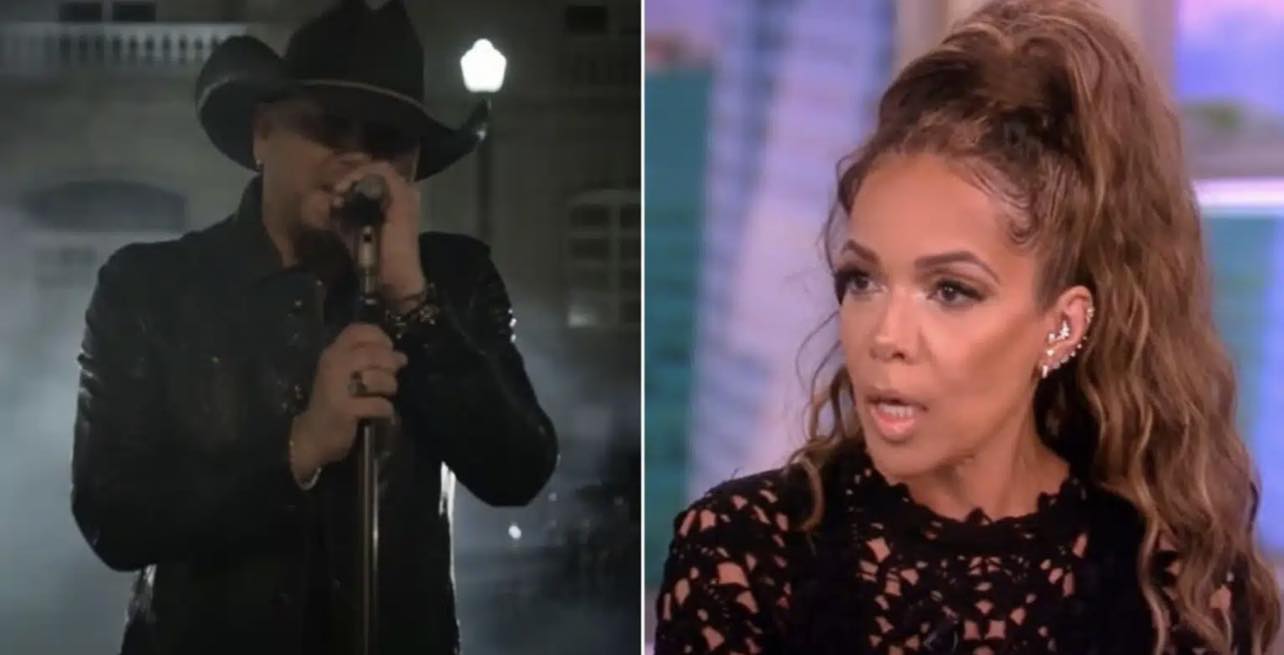ABC’s “The View” had to include a “legal” notice following Thursday’s program after the co-hosts made several false claims about country music star Jason Aldean’s hometown.
The discussion centered around his hit song, “Try That In A Small Town,” which was actually released in May but has recently garnered attention — and criticism — from the left because of its use of footage of the 2020 riots.
The song contains lyrics describing instances of behaviors by rioters and protesters, such as burning a U.S. flag, screaming at police officers and spitting on them, among other violent acts like starting fires, breaking out windows, and causing other mayhem and damage — all backed up by actual footage in the video. The song then goes on to warn others not to try such behavior in small towns, implying that residents who live there would not put up with it (see the video below).
Aldean, who is unabashedly conservative, has responded to the criticism by explaining that nothing in the video is meant as an attack on anyone or any group in particular, but rather the behaviors of certain individuals during that riotous period.
But true to form, the liberal co-hosts on The View took a different approach and made a number of allegations that, according to Aldean’s explanations, were patently false.
“I’m actually not going to give [Aldean] the benefit of the doubt,” Sunny Hostin, a former attorney, said at one point.
“As a lawyer, when I put my legal hat on, I don’t believe in censorship,” she continued. “However, this man is from Macon, Georgia. My father’s from Augusta, Georgia, and Macon, Georgia. I spent many summers there. … It is one of the most racist places in this country.
“So don’t tell me that he knew nothing about what that imagery [from the music video] meant. … So I don’t give him the benefit of the doubt,” she claimed.
The Western Journal pointed out that Macon County is majority black: 59.3 percent to 37 percent white.
At the end of the segment, Hostin had to read a “legal note” that was essentially a statement from Aldean and his team.
“Oh, I’m sorry,” she said. “I have a legal note: Jason Aldean defended his song in a statement, saying the references people have made are not only meritless but dangerous.”
“He added there is not a single lyric in that song that references race or points to it, and there isn’t a single video clip that isn’t real news footage,” she continued.
“Did you ever hear of a dog whistle?” co-host Joy Behar chimed in, essentially discounting Aldean’s explainer and accusing him of sending a subliminal message of hate.
In a recent Truth Social post, former President Donald Trump praised Aldean, saying, “Jason Aldean is a fantastic guy who just came out with a great new song. Support Jason all the way. MAGA!!!”

The artist himself addressed the issue on social media.
“In the past 24 hours I have been accused of releasing a pro-lynching song (a song that has been out since May) and was subject to the comparison that I was not too pleased with the nationwide BLM protests. These references are not only meritless but dangerous,” Aldean wrote in a tweet earlier this week.
“There is not a single lyric in the song that references race or points to it – and there isn’t a single video clip that isn’t real news footage – and while I can try and respect others to have their own interpretation of a song with music – this one goes too far,” he said.
Aldean then referenced his personal experience with mass violence, recalling his performance during the tragic Route 91 Harvest music festival in 2017. During the event, a man opened fire, claiming the lives of 61 people.
“As so many pointed out, I was present at Route 91 – where so many lost their lives – and our community recently suffered another heartbreaking tragedy,” he said, adding a reference to a recent school shooting in Nashville in March that left six dead.
“NO ONE, including me, wants to continue to see senseless headlines or families ripped apart. ‘Try That In A Small Town,’ for me, refers to the feeling of a community that I had growing up, where we took care of our neighbors, regardless of differences of background or belief. Because they were our neighbors, and that was above any differences,” he continued.
“My political views have never been something I’ve hidden from, and I know that a lot of us in this country don’t agree on how we get back to a sense of normalcy where we got at least a day without a headline that keeps us up at night. But the desire for it to – that’s what this song is about,” he said.
“To me, this song summarizes the way a lot of people feel about the world right now. It seems like there are bad things happening on a daily basis, and that feels unfamiliar to a lot of us. This song sheds some light on that.”

